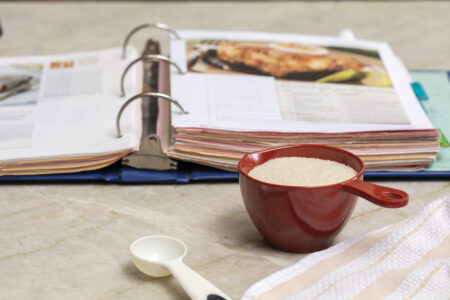Nothing’s more frustrating when cooking or baking than getting partway through a recipe and discovering that you’re lacking one ingredient. We’ve all been there. Thankfully, many ingredients have substitutions that don’t typically affect the flavor or texture of a recipe.
Here are a few substitutions for common ingredients that you may want to tuck away somewhere, just in case you find yourself in a pinch. And remember, when a substitution calls for liquid, you’ll need to decrease other liquids in the recipe by that same amount.
- 1 teaspoon baking powder: 1⁄4 teaspoon baking soda plus 1⁄2 teaspoon cream of tartar, or 1⁄4 teaspoon baking soda plus 1⁄2 cup buttermilk
- 1 cup cake flour: 1 cup all-purpose flour minus 2 tablespoons
- 1 cup vegetable oil, for baking: 1 cup applesauce, or 1 cup fruit puree
- 1 cup wine: 1 cup chicken or beef broth, or 1 cup fruit juice plus 2 teaspoons vinegar
- 1 cup buttermilk: 1 cup yogurt, or 1 tablespoon either lemon juice or vinegar in 1 cup milk
- 1 cup bread crumbs: 1 cup cracker crumbs, or 1 cup ground oats
- 1 cup heavy cream: 1 cup evaporated milk, or ¾ cup milk plus 3 tablespoons butter
- 1 teaspoon lemon juice: 1⁄2 teaspoon vinegar, or 1 teaspoon white wine, or 1 teaspoon lime juice
Lois Hoffman
Grit blogger
We live in a small, old house, and our electrical panel doesn’t allow us to have a water softener. Because of this, we end up with a lot of limescale on our faucets and bathtub. Commercial cleaners don’t work well, and they don’t smell nice at all. As an alternative, we use vinegar as a cleaning solution. Vinegar is readily available, and it’s inexpensive. Plus, the scent isn’t overpowering and doesn’t linger for hours after using it.
I cleaned out my coffee maker with white vinegar. I filled the reservoir with 4 cups of vinegar and then turned the coffee maker on. Once the vinegar ran through the machine, I ran two more pots of water through to rinse out the vinegar. Afterward, there was no more hissing and gurgling, and I didn’t have to wake up to no coffee.
Don’t use vinegar to clean granite or stone countertops, stone floor tiles, electronics, or anything made of calcium carbonate. Also, don’t mix vinegar with bleach, because it can create chlorine gas, which is toxic.
Mary Lewis
Grit blogger
If you have garden, farm, or home advice you’d like to share, send an email to Letters@Grit.com, or mail a letter to 1503 SW 42nd St., Topeka, KS 66609. We pay $25 for each tip we publish.
Visit www.Grit.com and search “reader letters” to see what other members of the Grit community have been up to lately.








